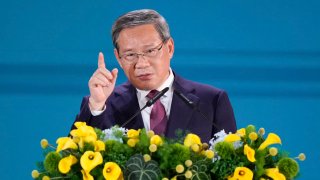- Chinese Premier Li Qiang singled out the electric-vehicle sector, urging strengthened cost oversight and price monitoring.
- Beijing needs to balance the task of curbing excess supply without stalling growth or putting jobs at risk, economists say.
- Some industrial players have reportedly planned to cut output, but it is unlikely to translate into a broader supply drawback, economists say.
Chinese Premier Li Qiang has called for tighter pricing regulation in the electric car sector during a
high-level meeting
Wednesday, as Beijing sought to rein in the cut-throat price wars that are fueling deflationary pressures in the economy.
Stream San Diego News for free, 24/7, wherever you are with NBC 7.
In singling out the country’s electric-vehicle sector, Li urged strengthened cost oversight and price monitoring. He also called on major automakers to make timely payments to suppliers while practicing greater self-discipline in setting prices.
Automakers should improve their competitiveness through technological innovation and quality upgrades, Li said.
Get top local San Diego stories delivered to you every morning with our News Headlines newsletter.
The long-simmering concerns about oversupply and bruising price wars have come to the fore, with Chinese policymakers taking aim at what was described as “involution” — the
fierce but often destructive competition
— particularly in sectors saddled with surplus capacity, such as EVs, solar panels and steel bars.
In a sign that the intensifying price wars have taken a toll on businesses, China’s industrial profits
plunged 9.1%
in May. Its factory-gate producer prices also slipped by 2.8% in the first six months of the year from a year ago, official data showed.
Profits for Chinese carmakers
dropped 11.9% year over year
in May, even as sales volume of cars in the country rose 11.7% during the same period, according to the
China Association of Automobile Manufacturers
, with over half of them being new energy vehicles.
Money Report
Disney’s spent 70 years funneling IP into its theme parks. Here’s why it works
Crypto accumulator DeFi Development to expand globally by franchising its Solana treasury model
The auto industry association in May called to halt the
“vicious competition,”
which it said has bitten into businesses’ profitability and threatened the security of the supply chain.
Sluggish consumer demand has also strained profit margins for businesses. Li also called for renewed efforts to boost domestic consumption, remove “unreasonable restrictions that thwart household spending” and optimize policies for a consumer goods trade-in program.
The National Statistics Bureau’s deputy head Sheng Laiyun said at a
press briefing Tuesday
that there has been progress made in the solar panel, cement and automobile industries in easing such price cuts without government intervention.
Even as China shifts its policy messaging to tackle the price wars, economists pointed out that Beijing needs to balance the task of curbing excess supply without stalling growth or putting jobs at risk, especially as an intense trade war with the U.S. has cast doubts over external demand for its goods.
Economists at Nomura Bank suggested that attempts to address the surplus capacity would involve substantial production cuts for manufacturers that have been selling products at a loss.
However, curbs on investment flowing into the industrial sectors and production outputs would likely generate an additional drag on the economy.
“Production cut inevitably comes at the cost of growth and jobs,” said Neo Wang, lead China economist and strategist at Evercore ISI, suggesting Beijing is unlikely to meaningfully cut back capacity.
“Ensuring growth and saving jobs are of higher priority to Beijing than correcting disinflation or deflation,” Wang added, stressing that “the voices so far sound like a slogan for a short-lived campaign at best, rather than a prelude to any reform,” Wang added.
China reported Tuesday that its economic growth beat expectations,
expanding 5.2% in the second quarter
, putting the country on track to meet its official full-year growth target of 5%.
While some companies across various industries have
reportedly
planned to cut output, it may not translate into a broader supply drawback, said Tianchen Xu, senior economist at Economist Intelligence Unit.
“There are always people who want to expand their market share with low price. Even if a price alliance is formed, firms can still betray the alliance and undercut competitors,” Xu said.
Also on CNBC
-
Jensen Huang woos Beijing as Nvidia finds a way back into China
-
Foreign investors flock back to China, chasing the next AI star
-
Labubu-maker shares drop, investors unimpressed by Pop Mart forecast profit surge







